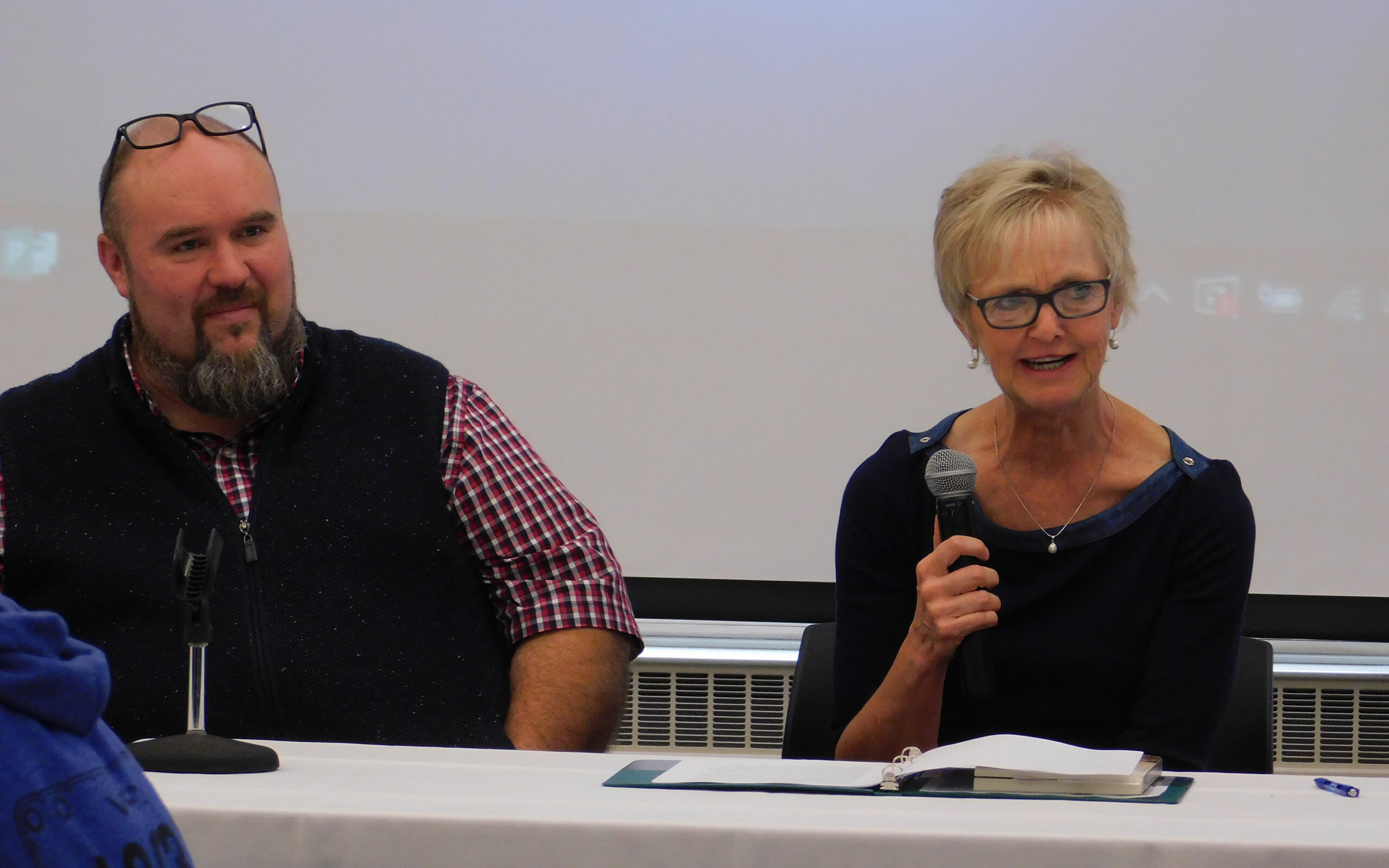
PRESQUE ISLE, Maine — For a few years beginning in the mid-1990s, a group of literary lovers and writers joined forces to put together a three-day conference held every two years to join local writers, students, established authors and teachers.
They called it the Voices in the North Country Symposium.
But after 2000, the symposium didn’t happen again for nearly 20 years. The first year of the symposium held in 1994, relied on outside grant funding to bring the idea to fruition, which became more difficult to secure as the years passed.
Such budgetary limitations forced the conference to falter shortly after its inception.
But last spring, a local journalist and an alum of the University of Maine at Presque Isle saw an opportunity to host a writing conference.

Kathy Olmstead presents the discussion for the panel during the Voices in the North Country Writers Symposium on Thursday, Sept. 26, 2019.
(Staff Photo/ Nina Mahaleris)
Melissa Lizotte approached the university with an idea to organize an event to connect local established and aspiring writers.
Soon after, she and Deborah Hodgkins, an associate professor of English, paired up to bring back the Voices in the North Country Symposium.
“Since the time that I was an English major at UMPI, I’ve thought about how great it would be to host an event dedicated to connecting students and other aspiring writers in the community with published authors,” Lizotte said in a press release on the event.
“Such experiences are crucial for aspiring writers. Hearing authors share their stories of challenges and successes in writing can help them develop their own unique voice in their genre.”
Working with the distinguished lecturer series at UMPI, the Voices committee organized and invited four local authors to present their individual works at the symposium and brought well-known author, Kathy Olmstead to host a panel on “Writing What You Know.”
Theodore Van Alst, the distinguished lecturer of the evening and an associate professor and Director of Indigenous Nations Studies at Portland State University, shared his own work and discussed how he approached writing about growing up in Chicago.
Van Alst, who lived briefly in Bridgewater while attending UMPI, spoke about his unique writing process and writing what you know but also venturing into writing what is unfamiliar. “Write the stories you want to read,” he said.

Dr. Theodore Van Alst, Jr. (left) and Anthony Scott (right) discuss the writing process during the panel at the Voices in the North Country Writers Symposium on Thursday, Sept. 26, 2019.
(Staff Photo/ Nina Mahaleris)
In agreement, the other three panelists of the evening, Anthony Scott, Jenny Radsma and Alice Bolstridge, encouraged young writers to think of the writing process as a path to self-discovery.
Scott and Radsma also shared an inside look into how they used writing to help understand pain and grief. Scott, whose book, “The Year Things Came Apart,” details his experience trying to make sense of a family betrayal and what it means to forgive someone for past mistakes.
In talking about his own writing process, Scott explained that he never set out to write a book about his father leaving their family to start a life with a new woman, but instead found himself using his craft as a way to cope with the loss.
Radsma, who has published stories about her mother nearing the end of her life, said that writing is a never-ending process. “Writing is like taking down wallpaper — you’re never done,” she said.

Local author, Anthony Scott, reads an excerpt from his book, “The year things came apart,” during the Voices in the North Country Writers Symposium on Thursday, Sept. 26, 2019.
(Staff Photo/ Nina Mahaleris)
One UMPI student also read an excerpt of a recently finished short story. Manish Pandey, a sophomore from Nepal, shared his work, “A Peculiar Shade of Blue.” He was previously featured in UMPI’s student literary journal, “Upcountry”.
Speaking of how the program was re-ignited, Rachel Rice said it was thanks to a collaborative effort that Lizotte started. “There were people at the time who were really passionate about the project,” said Rice.
Lizotte, who also is a part-time reporter for The Star-Herald, said she hopes to bring the symposium back next year. She said she wants to incorporate more authors from downstate who can share their unique perspectives with writers in The County.
In his closing remarks for the panel, the authors encouraged attendees to explore their own unique writing process.
“Writing is self-empowering,” Scott said. “Don’t be afraid to write what would make your mom or your preacher blush.”







